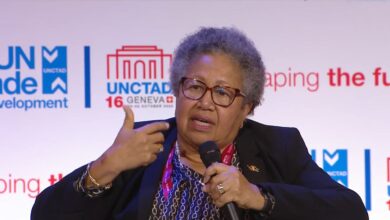(CARICOM Secretariat, Turkeyen, Georgetown Guyana) Secretary-General of the Caribbean Community (CARICOM) His Excellency Edwin Carrington told the 21st Meeting of the Community Council of Ministers that the issues before it required “the most profound consideration in determining the best course of action in the interest of improving the quality of life of our citizens.”
The Secretary-General cited the issues of cost of living, expansion of the categories of skilled nationals eligible for free movement within the Community, the work of the Caribbean Commission on Youth and Development, implementation of the Declaration of Port of Spain with respect to Non-communicable Diseases and the effects of the Economic Partnership Agreement (EPA) initialed between the Region and Europe as matters which are particularly relevant to the people of the Region.
In addressing the one-day meeting which took place in Barbados on Friday 8 February the Secretary-General took the opportunity to convey sincere appreciation to Dame Billie Miller the former Barbados Minister of Foreign Affairs and Foreign Trade, for her sterling contribution to the deliberations of the Council during her tenure.
Mr. Carrington reminded the Council that as the Community’s second highest decision-making body with the “primary responsibility for the development of Community strategic planning and coordination” across the key areas of Community activity” it had a “major, indeed a determining influence on the development of our entire Community.”
“Indeed, it can be said that without a well-functioning Community Council there can be no well-functioning Community,” the Secretary-General added.
The Honourable Christopher Sinckler Minister of Foreign Affairs, Foreign Trade and International Business of Barbados at his first meeting of the Council assured members that the new Government of Barbados was committed to “full and productive engagement” with the Community to “continue this dynamic regional integration project.”
Mr. Sinckler said as CARICOM moved towards the further consolidation of the Single Market, and ultimately a single economy, there were “strong indications that we have yet fully to realise the scope of the opportunity before us, even in the face of inherent challenges.”
In pointing to the important matter of functional cooperation, the Minister said that anaemic intra-regional trade flows had shown that the strength of the community lay not singularly in economic and trade policy, but that there was a “strong case to be made for the development of the non-tradeables.”
“We must work assiduously towards the full development of the functional cooperation mandate in the Region. We must approach this project, with visionary foresight, and with the passion for regional cooperation that energised the crafters of the early integration movement,” he added.
Mr. Sinckler said that future generations in having an opportunity to reflect on the Region, should be able to look “on us, as visionaries, who added important layers to the institutional scaffolding that will support a prosperous and ‘extraordinary’ regional union – a unified Caribbean Community based on the principles of strong economic growth, innovation, balanced trade, social and human growth and full, holistic development. We have made admirable strides, but there is still a long and difficult road ahead. We must be prepared to stay the course,” the Minister concluded.
The meeting which saw ten Ministers among eleven Member States represented was presided over by the Deputy Prime Minister and Minister of Foreign Affairs of The Bahamas, the Honourable Brent Symonette.





